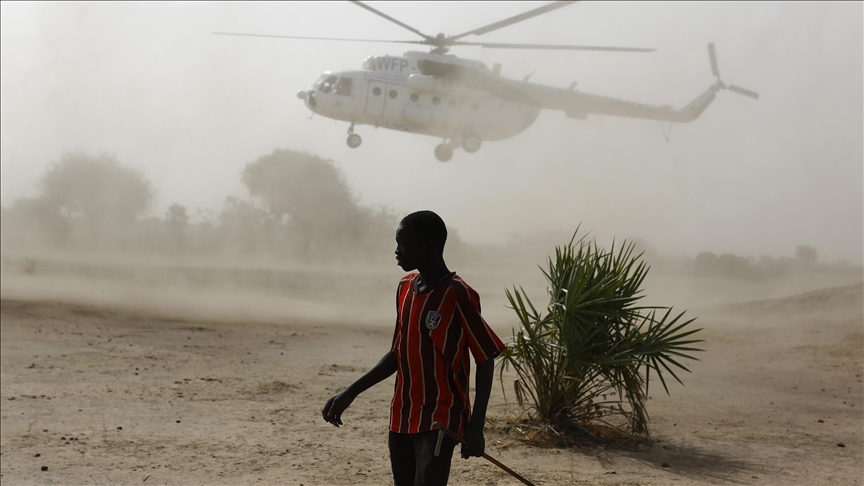South Sudan rejects renewal of UN sanctions
Renewal of sanctions and arms embargo will affect implementation of security arrangement, says country’s foreign minister
 ( Handout/UNICEF/Modola - Anadolu Agency )
( Handout/UNICEF/Modola - Anadolu Agency )
JUBA, South Sudan
South Sudan on Wednesday rejected the renewal of sanctions and an arms embargo by the UN Security Council.
The Security Council extended the sanctions regime imposed on the country for one year, which also included asset freezes and travel bans.
Several members stressed that instead of sanctions, the country needs a carefully managed support system to facilitate its transitional journey and overcome its security issues.
South Sudan’s Acting Minister of Foreign Affairs Deng Dau Deng Malek said his country regrets and objects to any renewal of the sanctions because this is unjustified.
“This was done in bad faith and with ill intention under the spotlight of being a state with a lot of abuses,” Deng told Anadolu by phone in the capital Juba.
He said they have done their part as the government by implementing the provisions of the 2020 peace agreement and have gone far to implement the provisions of the benchmark that was earmarked for the removal of these sanctions.
Deng said the renewal of the sanctions and arms embargo will affect the implementation of the security arrangement.
“We wanted to graduate (the unified forces) to the second phase and deploy (them), but now that will not happen. We had planned to arm and deploy the unified forces to the cantonment sites,” he said.
He added that the sanctions will be the main factor that affects the economy, trade, commerce and the security of the country.
“Prices will now shoot up because we are a landlocked country and South Sudan relies heavily on things imported from the neighboring countries,” he said.
Deng said that investors will not have an interest in coming to South Sudan because it is a country under sanctions.
“This is a bad name, and we are very unhappy with it,” he added.
UN Security Council Resolution 2683 (2023) was adopted by a vote of 10 in favor (Albania, Brazil, Ecuador, France, Japan, Malta, Switzerland, the United Arab Emirates, the UK and the US) to none against, with five abstentions (China, Gabon, Ghana, Mozambique and the Russian Federation).
The Council strongly condemned past and ongoing violations of human rights and international humanitarian law by all parties, including by armed groups and national security forces.
It further condemned the targeting of civil society, including journalists, human rights defenders and humanitarian personnel, emphasizing that the Revitalized Transitional Government of National Unity bears the primary responsibility to protect its population from genocide, war crimes and crimes against humanity.
The Council decided to renew until May 31, 2024 the measures on arms imposed by paragraph 4 of Resolution 2428 (2018), which direct all member states to prevent the direct or indirect supply, sale, or transfer of arms to the territory of South Sudan.
It also decided that the notification requirements set out in paragraph 2 of Resolution 2633 (2022) shall no longer apply to the supply, sale or transfer of non-lethal military equipment solely in support of the implementation of the terms of the peace agreement and related technical assistance or training on such equipment.
By other terms, the Council decided to renew until May 31, 2024 the travel and financial measures imposed by Resolution 2206 (2015), according to which all member states shall take measures to freeze the financial assets of designated individuals and prevent their entry into or transit through their territories.
Further, the Council decided to extend until July 1, 2024 the mandate of the Panel of Experts as set out in paragraph 19 of Resolution 2428 (2018), adding the panel should provide to the Council an interim report by Dec. 1, 2023, a final report by May 1, 2024 and updates each month.
The Council reiterated its readiness to review arms embargo measures through, inter alia, modification, suspension or progressive lifting of these measures in the light of progress achieved on the key benchmarks. It also requested the Secretary-General, in close consultation with the United Nations Mission in South Sudan (UNMISS) and the panel, to conduct an assessment of progress achieved no later than April 15, 2024.
Tigere Chagutah, Regional Director, Amnesty International, East and Southern Africa, welcomed the extension of the UN arms embargo on South Sudan.
“The UN Security Council vote sends a clear message to the South Sudanese government that it must act urgently to implement the Joint Action Plan on addressing conflict-related sexual violence, among other benchmarks set by the Security Council under Resolution 2577 of May 2021.
“Although this vote is a positive step, we regret that South Sudan will now be allowed to import ‘non-lethal’ equipment without the need to inform and request an exception from the Security Council’s sanctions committee,” said Chagutah.
Anadolu Agency website contains only a portion of the news stories offered to subscribers in the AA News Broadcasting System (HAS), and in summarized form. Please contact us for subscription options.







